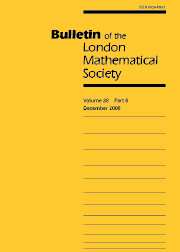Article contents
UNCERTAINTY INEQUALITIES FOR FOURIER SERIES OF PAIRS OF RECIPROCAL POSITIVE FUNCTIONS
Published online by Cambridge University Press: 01 May 1999
Abstract
In the early 1930s, Wiener proved that if f(x) is a strictly positive periodic function whose Fourier series is absolutely convergent, then the Fourier series of g(x)=1/f(x) is also absolutely convergent [8, pp. 10–14]. This phenomenon can be easily understood nowadays using Banach algebra techniques (see, for example, [4, pp. 202–203]). In fact, these techniques allow us to study the absolute convergence of g(x)=F(f(x)), where F is holomorphic in an open subset of [Copf ] that contains the range of f(x) (for x∈ℝ). In this context, Wiener's original problem corresponds to the choice F(z)=1/z.
In this work we want to analyse the constraints on the simultaneous rate of vanishing of the Fourier coefficients fˆ(n) and ĝ(n) as n→∞. We shall focus on g=1/f, but we shall also study the general case g=F(f). In either case, there are obviously no constraints when f is a constant function.
Although this problem does not seem to be directly related to uncertainty inequalities for the Fourier Transform, we observe that there are some analogies, both in the nature of the results and in the proof techniques. The general fact with which we are dealing is that fˆ(n) and ĝ(n) cannot vanish too quickly at the same time as n→∞, unless f(x) is constant. The general fact that underlies uncertainty inequalities is that a non-periodic function ϕ(x) and its Fourier Transform ϕcirc;(u) cannot vanish too quickly at the same time as x→∞ and u→∞, unless ϕ(x) is zero (almost everywhere). For a simple introduction to some aspects of uncertainty inequalities, see [5]; for a thorough and recent introduction to this vast subject, see [3].
- Type
- NOTES AND PAPERS
- Information
- Copyright
- © The London Mathematical Society 1999
- 1
- Cited by


